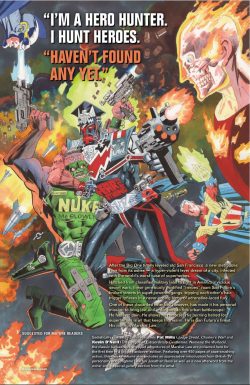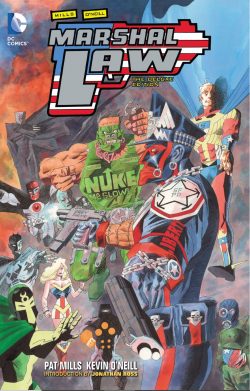

By Pat Mills & Kev O’Neill, with Mark A. Nelson & Mark Chiarello, lettered by Phil Felix, Steve Potter & Phil Oakley (DC Comics)
ISBN: 978-1-4012-3855-1 (HB/Digital edition)
Win’s Christmas Gift Recommendation: Ultimate Antihero Excess… 10/10
Hard to believe, I know, but not everybody likes superheroes.. Some folks actively loathe them. And then there’s Pat Mills & Kev O’Neill…
One of the greatest creative forces in British comics, Pat Mills began his career at DC Thomson. He wrote girls comics and humour strips; moved south to IPC and killed posh-comics-for-middle-class-kids stone-dead by creating Battle Picture Weekly (1975 with John Wagner & Gerry Finley-Day), as well as Action (1976), 2000AD (1977) and Starlord (1978). Along the way, he also figured large in the junior horror comic Chiller…
As a writer he’s responsible for Ro-Busters, ABC Warriors, Nemesis the Warlock, Slaine, Button Man, Metalzoic, and Requiem Vampire Knight among many, many others. That also includes Battle’s extraordinary Charley’s War (with the brilliant Joe Colquhoun): the best war strip of all time and one of the top five explorations of the First World War in any artistic medium.
Unable to hide the passions that drive him, his most controversial work is probably Third World War which he created for the bravely experimental comics magazine Crisis. This fiercely socially conscious strip blended his trademark bleak, black humour, violence and anti-authoritarianism with a furious assault on Capitalism, Imperialism and Globalisation. It even contained elements of myth, mysticism, religion and neo-paganism – also key elements in his mature work.
Some of his most fruitful collaborations happened when teamed with the utterly unique and much-missed Kevin O’Neill. In 1988 O’Neill won the singular accolade of having his entire style of drawing – not a panel, not a story, but every single mark he left on paper – banned by the USA’s dried-up-but-not-quite-dead Comics Code Authority!
Not that it stopped the rise of his remarkable and truly unique talent in later triumphs such as Serial Killer, The League of Extraordinary Gentlemen and of course, Marshal Law…
“Kev” was born in 1953 and, aged 16, began work as an office boy/art corrector for British weekly Buster. He worked in every aspect of the compartmentalised industry: lettering, art paste-up, logo design, colouring and more…
As the kids’ stuff began to pale, life changed in 1977, when author/editor Mills transferred him to a forthcoming, iconoclastic new science fiction comic. O’Neill became a mainstay of 2000 AD: producing covers, pinups and Future Shock short stories, whilst contributing to serials like Ro-Busters, satirical super parody Captain Klep, ABC Warriors and his personal breakthrough character Nemesis the Warlock.
From there on, America came calling in the form of DC Comics, but his efforts on edgier science fiction titles like Green Lantern and Omega Men, graphic novel Metalzoic (and Bat-Mite!) only reinforced how different he was. Happily just as his “style of drawing” was banned by the American Comics Code Authority the marketplace changed completely…
In 1987 Marvel’s creator-owned imprint Epic Comics published a 6-issue miniseries starring a hero superficially very much in the vein of Judge Dredd, but one who took the hallowed American creation of the superhero genre and gave it a thorough duffing-up, Brit-boy style. It was the wholly traditional tale of a (costumed) cop who did the Right Thing and did it His Way…
San Futuro is a vast metropolitan urban dystopia built on the Post-Big Quake remnants of San Francisco. America is recovering from another stupid, exploitative war in somebody else’s country, and – as usual – demobbed, discharged, discarded, damaged, brain-fried grunts and veterans are clogging the streets and menacing decent society. The problem is that this war was fought with artificially manufactured superheroes, who eventually came home to become a very dangerous embarrassment. Marshal Law was one of them, but now he’s a cop; angry and disillusioned but dedicated. His job is to put away bad guys, but it’s hard to tell them apart from the “good” ones. This establishing series was collected as Marshal Law: Fear and Loathing.
This hefty compilation gathers the ever-peregrinating strip as it appeared under many publishers’ banners. It gathers Marshal Law #1-6, Marshal Law: Crime and Punishment, Marshal Law Takes Manhattan, Marshal Law: Kingdom of the Blind, Marshal Law: The Hateful Dead, Marshal Law: Super-Babylon & Marshal Law: Secret Tribunal 1-2. It opens with an Introduction from comics megafan/TV personality Jonathan Ross and stunning and informative ‘Map of San Futuro’ offering a ‘Welcome to San Futuro – Home of Law and Disorder’ before ‘Fear and Loathing: A Prologue’ introduces the world’s greatest hero. Colonel Buck Kaine AKA The Public Spirit has returned from a divine, ordained mission to the stars and his example inspired a certain young man to enlist in the SHOCC (Super Hero Operational Command & Control) program that created all the now-unwanted superbeings infesting Sat Futuro and the world…
Fear and Loathing begins with ‘Stars and Strippers’ as a rapist serial killer terrorises the city, distracting weary Marshal Law from his preferred targets: degenerates, thugs and thieves like Gangreen…
Marshal Law was once a forgotten supersoldier like them, but now he’s a cop: burned-out, angry and extremely disillusioned. His job is to put away rogue masks and capes, but as bad as they are, the people he works for are worse. Some heroes like The Public Spirit have the official backing of the government and can do no wrong – which is a huge problem as the solitary Marshal is convinced that he’s also the deadly rapist/serial killer called the Sleepman…
The case powerfully and tragically unfolds with bleak black humour, grim excess and raging righteous fury in ‘Evilution’, ‘Super Hero Messiah’, ‘Conduct Unbecoming’, ‘Mark of Caine’ and ‘Nemesis’: a savage parody of beloved genre stars and motifs, and uncompromising commentary and satirical attack on privilege, prestige, US policies and attitudes, in comics and the real world. However, Fear and Loathing is also a cracking good yarn for thinking adults with mature dispositions, open minds, and who love seeing injustice punished.
In the 1989 Epic Comics one shot ‘Marshal Law Takes Manhattan’, Mills & O’Neill – with additional inks by Mark A. Nelson and colours from Mark Chiarello – went after the entire (thinly disguised) Marvel Comics pantheon, with old zipper-face dispatched to New York to extradite a war criminal – and Law’s old army trainer – The Persecutor. Unfortunately (for them), the mass killer has hidden himself amongst the inmates of “The Institute”: a colossal Manhattan skyscraper housing all the Big Apple’s native superheroes. Each and every is one a brilliant, barmy, bile-filled parody of Marvel’s Mightiest …and they don’t stand a chance against disgust and righteous indignation…
Mills & O’Neill brought their new toy to British independent outfit Apocalypse, publishers of Toxic, a short-lived (March to October 1991) but talent-heavy rival to 2000 AD. Naturally, carnage and mayhem were the result, but not before author Mills slips a few well-aimed pops at US covert practices and policies in South America under the door.
That troubled, influential periodical was originally preceded by Marshal Law Special ‘Kingdom of the Blind’ at the end of 1990, which has been slotted in here…
Although played for more overt laughs than previous tales, the vented spleen and venom displayed in this captivating yarn is simply breathtaking, with the creators putting the boot into the most popular hero of the time. The Private Eye had trained himself to fight criminals ever since his parents were murdered in front of him. For decades he made the night his own, to universal acclaim: even Marshal Law thought he was the exception that proved the rule…
When circumstances force the Marshal to question his beliefs, he uncovers a snake-pit of horror and corruption that shakes even his weary, embittered sensibilities, and makes him wonder why nobody ever questioned how one hero could get through so many sidekicks…
Second Special ‘The Hateful Dead’ – lettered by Steve Potter – began a 2-part odyssey wherein the toughest cop in San Futuro faced an undead plague after a Toxic accident (tee-hee; d’you see what they did there?) resurrects a graveyard full of dead supermen – many of them put there by Marshall Law -as well as ordinary ex-citizens to bedevil the conflicted hero-hunter. The story ended on an incredible cliffhanger… and Apocalypse went bust.
After two years Law jumped back across the pond to Dark Horse Comics, concluding the yarn in ‘Super Babylon’ wherein the resurgent Bad Cop quelled the return of the living dead and – just by way of collateral damage – devastated assorted superhero pantheons by ending thinly disguised versions of the Justice Society and League as well as WWII super-patriots like the Invaders and Captain America. All this happened a decade before Marvel Zombies stirred in their graves or The Walking Dead pulled on their brain-stained boots…
In addition, the creators couldn’t resist one more mighty pop at American Cold-War Imperialism that’s both utterly over-the-top and hilarious – unless you’re a Republican, I suppose…
Additionally, there’s a wicked spoof as ‘Naked Heroes by Veegee’ shares the candid snaps of a super-celeb paparazzo and the art for Marshal Law’s feature in Hero Illustrated (May 1994)…
Less contentious – unless you’re a devoted fan of the Alien movies/comics or The Legion of Super Heroes – is Secret Tribunal. Lettered by Bill Oakley, it begins with Cape Fear’ as the Marshal is deployed to an orbiting Space Station where the government grows its manufactured superbeings, just as a nasty incursion of fast-breeding carnivorous space-beasts starts ripping the immature adolescent and primarily teenaged supermen and wonder women to gory gobbets…
Even though the hero hunter is ordered to bring with him a super-team (riffing off certain Marvel mutants…), in the end the only solution is a ruthless and highly personal ‘Court Marshal’…
Supplemented by an ‘Afterword by Pat Mills’ that shares his reasons for “hating heroes” and a stunning ‘Shooting Gallery’ of covers, designs, foreign edition art, previous collection covers, retail posters, and more to augment the experience of Futuro shock, this is classically inappropriate mayhem: just who could resist it?
Mills’ incisive observation, sharp dialogue, brilliant scenarios, great characters, stunningly memorable one-liners and hilariously compelling stories full of twists and surprises are magnificently brought to life by the cruelly lush art and colours of O’Neill: an artist so crazed with the joys of creation that every panel overflows with so many visual and typographical ad-libs that you could read this book one hundred times and still find new treats to make you laugh and wince. So I’m thinking that perhaps you really should…
© 1987, 1988, 1989, 1990, 1991, 1992, 1993, 2013 Pat Mills & Kevin O’Neill. All Rights Reserved.
